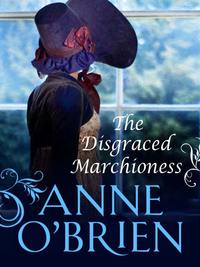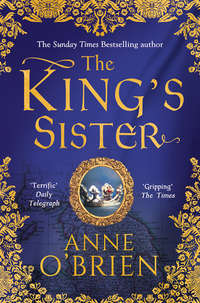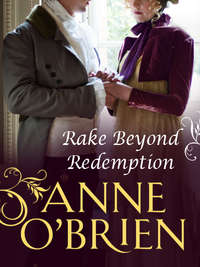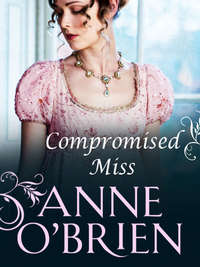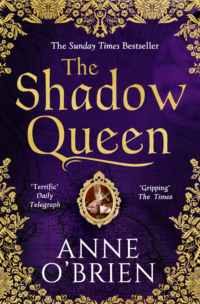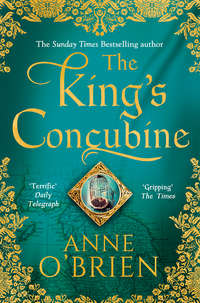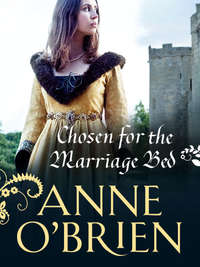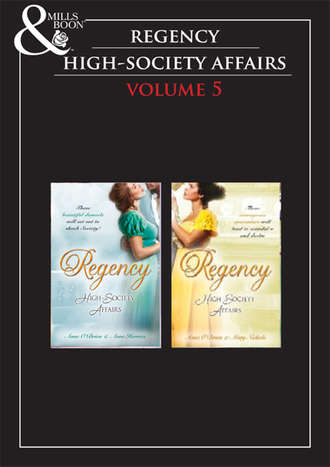
Полная версия
Regency High Society Vol 5: The Disgraced Marchioness / The Reluctant Escort / The Outrageous Debutante / A Damnable Rogue
‘Are you sure?’ Henry frowned. Whatever they had hoped for, this was most unexpected.
‘Sure! Of course I am! I would wager my emeralds on it.’
‘But she may have more than one brother.’ Eleanor refused to believe that at the eleventh hour there might be the slightest chink of light, of hope, in the dark walls which hemmed her in. ‘You may have met—’
‘Don’t be foolish, my girl. That is not the man who squired Octavia to parties in her London Season.’
‘And I distinctly remember the occasion when Sir Edward said that he had been with Octavia when she had made her curtsy to the polite world!’ Henry allowed the fact to filter slowly through his brain with all its possibilities. ‘Why are you so sure, ma’am?’
‘I remember the brother very well—because I took him in instant dislike. Octavia was charming enough, but no family would wish to acquire her brother around the dining table, take my word for it. He had the appearance of a gentleman and the manners were well-bred enough—but there was an unpleasantness about him. You would not trust him with a purseful of gold. Or with the reputation of any pretty young woman—he had quite an eye for them, I am afraid. Or so my husband informed me. I understand he frequented some of the more unsavoury gaming establishments in town. Also I was led to understand that he had an arrangement with a lower class of woman—if you take my meaning. Not that you would be acquainted with any such shady dealings of course, Henry.’ She dared Henry to contradict her, but he recognised the glint of humour in her face.
‘Definitely not, Aunt. Can you describe him—the gentleman introduced as Octavia’s brother?’
‘Rather like Octavia, I suppose. Taller than Sir Edward. Slighter. A thin face. Hair not quite as fair, perhaps. And cunning eyes, my boy. Not quite the thing at all.’ Lady Beatrice furrowed her brow. ‘I cannot remember his name—I wish I could. Thomas did not like him either,’ she added inconsequentially.
‘It is not much to go on, but perhaps enough.’ Henry gripped his aunt’s hand in gratitude. ‘It may be that the whole family will owe you their thanks tonight for your part in overturning this cruel and malevolent plot.’
‘Family is important, Henry, as you very well know! It delights me that you are giving your support to Eleanor in a time of trial. Why you should wish to take yourself off to some Godforsaken wasteland on the far side of the world, I shall never know. Much better to settle here, take my word for it!’ Lady Beatrice, her mission completed, prepared to return to a cosy chat with one of her intimates. ‘But there is one thing I think you should do.’
‘And that is?’
‘Come, my boy! Use your wits! Ask Octavia how many brothers she has, of course.’
They held a post-mortem in the early hours of the morning when the guests had gone, Aunt Beatrice’s words heavy in their minds. Hope, so long dashed, began to run high, despite the essentially trivial nature of the information, and no one thought to claim exhaustion after so successful an evening.
‘So who is Sir Edward, if not Octavia’s brother?’
‘I see you like to start with the easy questions, Nick!’ Henry stretched out in a chair beside the settee on which Eleanor and her mama had taken up positions, his hands linked behind his head, ankles crossed. ‘We do not know the answer to that one!’
‘So what do we know?’ Mrs Stamford demanded clarification. ‘That her name was probably not Baxendale when Thomas met her. And Sir Edward is not her brother. Does it help us at all?’ Doubts still drew a sharp line between the lady’s delicate brows.
‘Octavia only has one brother,’ Eleanor put in quietly. ‘I asked her about her family, a casual query you understand, over a glass of wine. She said that Edward was the only family she had remaining alive. Her parents are dead and she had no sisters. She offered the information that she and her brother are, and always have been, very close.’
‘So we will work on the premise that Beatrice is correct.’ Henry frowned down at his highly polished boots.
‘But the innkeeper at the Red Lion—’ Eleanor turned towards Henry, impatient with her memories of their visit to Whitchurch ‘—he said Sir Edward had a sister who had a young child. And that the sister’s husband had recently died. A husband who rarely visited the Great House. Would he deliberately mislead us? I cannot see it.’
‘No. I do not think he lied.’ Henry found his mind working furiously with the scant evidence they had. ‘He would have no reason to do so—he did not know the reason for our visit.’
‘And they knew Sir Edward—both the landlord and the gardener,’ Eleanor reminded him again. ‘There was no dispute over his name or his living in the Great House.’
‘There was in all probability no reason to do so. He most likely is Sir Edward Baxendale and I am certain that he does live in Whitchurch. So consider. If you are going to set up a fraudulent claim to a valuable inheritance, surely it must be safer to use as much truth as possible. The more truth, the less chance for the lies to be suspected and detected. It is Octavia’s name which is in question after all, not Sir Edward’s. And the identity of her brother—although how he fits into the puzzle I know not.’
‘But Sir Edward has a sister with a baby,’ Eleanor persisted.
‘Yes. I don’t dispute it. But not Octavia.’
‘I still don’t know where that leaves us.’ Mrs Stamford lifted her hands and let them fall into her lap in frustration. She clearly spoke for them all.
‘Tell me, Eleanor.’ Henry now sat up and fixed the lady with a compelling stare. It appeared that he had come to some conclusions. ‘When you first saw the child John, what was your first thought?’
‘After I had recovered from the shock?’ She laughed a little. For the first time in days it seemed that a weight had been lifted from her mind. They still knew so little, yet there was a distinct crumbling in the edifice built up by Sir Edward. He had lied. And how many lies he had been prepared to tell they had yet to discover. She must hold on to the fact that Thomas’s marriage to Octavia was all a sham. And they would prove it! ‘I shall never forget those first revelations!’ she admitted. ‘I suppose I thought that the boy looked nothing like Thomas. And later Judith said—’
‘Judith said that Faringdons always breed true.’ Mrs Stamford smiled, the slightest touch of triumph as she followed the line of thought. ‘Look at dear baby Tom, the image of his father. And Judith is so like her father, apart from that unfortunate red hair which she inherited from Beatrice. But John looks like Octavia. Or even Sir Edward. Both very fair with blue eyes and fair complexions.’
‘What are you thinking? Who is the child’s father, if not Thomas?’ Eleanor’s face was suddenly flushed with a delicate colour.
‘I don’t know yet.’ Henry lifted his shoulders and let them fall, but there was the fire of battle in his eyes. ‘Who would know more about this?’
‘But look, Hal.’ Listening to the unfolding suppositions, sympathising with the need to destroy Sir Edward’s case, Nick could still see one major sticking point. ‘You have forgotten the documents. The marriage and baptism. All legal, signed and sealed, with witnesses. Guaranteed by Church and State. Can we argue round that? I don’t see it. We can destroy Baxendale’s credibility, but can we discount the documents in Hoskins’ possession? He certainly believes them to be above question.’
‘One witness of the marriage is dead.’ Eleanor reminded him. ‘Octavia’s mother. It is very convenient, I suppose.’
‘And do you remember the identity of the other?’ asked Henry. ‘It was Sir Edward. Even more convenient!’
‘So was the priest also lying? Witnessing something that never happened? Forging documents? Is that what you are suggesting?’ Mrs Stamford looked suitably shocked. ‘A man of the cloth, too! What a terrible muddle this all is.’
‘We need someone who can tell us more about the Baxendale family.’ Nicholas returned to his brother’s previous question. ‘Someone who will know about relationships, scandals, whatever, and be prepared to talk to us.’
‘That’s easy!’ Henry pushed himself to his feet to pour a glass of brandy, offering it to his brother. ‘Servants. They always know more about the family than the family members themselves. If you ever wish to know anything about the Faringdons, for the past two generations at least, ask Marcle. Don’t ever be under the misapprehension that you have any secrets, Nick!’
‘There is only the nursemaid here with them in London. Sarah, I think.’ Eleanor looked at her mama for corroboration.
‘Perfect! Eleanor…would you care to pay a visit to Faringdon House again tomorrow?’ Henry poured brandy for himself. ‘On the pretext of enquiring after Octavia’s health after her social introduction? And see if you can find an occasion to speak with Sarah.’
‘But what on earth do I ask?’ she demanded, startled at the role suddenly thrust at her. ‘Are your employers perhaps charlatans? Do they lie and cheat and—?’
‘I will go with you.’ Mrs Stamford rose to her feet. ‘Come, my dear. It is late. We will think of something. And if words do not get the right results, gold might! In my experience, money will open a multitude of doors.’
‘Well, Mama…’ Eleanor failed to hide her surprise ‘…I shall certainly not refuse your offer. We will be able to enjoy another exciting conversation with Octavia about the state of her roses! If you will accompany me, it may give us the opportunity to distract her so that one of us can talk to the child and Sarah. I shall take Tom with me. What a cosy family party we shall make, to be sure!’
‘Have faith, Eleanor. It seems that we have a mystery on our hands at last, rather than an open-and-shut case.’ Henry walked with habitual grace to open the door for the departing ladies, bowing them out. ‘And brother Thomas is beginning to look like an innocent pawn in an intricate and dangerous game of chance. More innocent by the hour.’
The ladies went to bed, deep in discussing tactics for the morrow. Hal and Nick sat on in the parlour, Hal deep in thought, a bottle of brandy between them.
‘What is it?’ Nicholas asked at last—his brother had spent the past ten minutes saying nothing, but staring into the fire.
‘I have been thinking.’
‘Never!’
Now he looked up, lips curving a little. ‘The documents presented by Sir Edward. They must be false. And Aunt Beatrice’s description of Octavia’s brother…’
‘So?’
‘Little brother.’ Henry smiled in gentle malice. ‘Would you care for another tour of the gentleman’s clubs and gaming establishments of London? And perhaps another informative conversation with Kingstone?’
‘No. I would not!’
‘I think this one may pay off. Just a hunch but. Say nothing to Eleanor. It would not do to raise her hopes until we have more concrete evidence than Beatrice’s ramblings. Our aunt has more faith in her memory than I have. But I think.I just think that we may have been looking for the wrong person!’
Chapter Eight

At eleven o’clock on the following morning, Mrs Alicia Stamford, as promised, accompanied by the Marchioness of Burford and the infant Marquis, all suitably dressed for an informal morning visit, took the barouche to cover the short distance to Faringdon House in style.
‘We must devise some means to encourage Octavia to bring the nursemaid and the child into the room. I doubt it will be too difficult.’ Mrs Stamford settled herself in the carriage in a decided manner and unfurled her parasol. ‘Since you have the baby with you, it would be natural to wish to praise and admire.’ She removed the tassel of her embroidered reticule from Tom’s inquisitive fingers with firm and well-practised skill. ‘I will engage Octavia in conversation. You may talk with Sarah about the family.’
‘Thank you, Mama!’ Eleanor’s smile was wry. ‘I am not sure who has drawn the short straw.’ She distracted Tom from eating the fingers of her new kid gloves. ‘I hope that she is of a confiding nature!’
As it happened, there was no need for devious plotting on the part of the two ladies. The morning was warm and sunny. There, in the private garden with its ornamental railing in the centre of Grosvenor Square, they spied Octavia Baxendale, her nursemaid and her son taking advantage of the mild temperature. Octavia sat comfortably beneath a tree, a little apart, a book open on her lap. On the grass some distance before her sat Sarah with the child John. High voices and excited shouts gave evidence that other families from the Square, both children and nursemaids, were enjoying the fine morning with childhood games.
‘Fortune smiles on us so far.’ Mrs Stamford gave her hand to their coachman and descended, all regal dignity, to take this crucial meeting with Octavia Baxendale under her control.
The ladies exchanged greetings. Enquired after their respective health. They had come, Mrs Stamford explained, to ask after the welfare of Miss Baxendale after the demands of the previous evening and her meeting the Faringdon family en masse. A most successful at home, was it not, as acknowledged by all. Lady Beatrice Faringdon had particularly commented on her enjoyment at renewing her acquaintance with Miss Baxendale. She clearly remembered their previous meetings very well, when Octavia had first made her curtsy, in spite of the passage of time. And had Sir Edward found it an amusing experience? Mrs Stamford had noticed that he played a skilful hand of whist.
Eleanor hid a smile and simply allowed her mother to continue unchecked. Octavia expressed no surprise, no recognition of, or response to, Mrs Stamford’s subtle comments and answered in her usual calm manner. She smiled. Her eyes rested on her visitors with guileless acceptance. She was very well. No, she had not found it unduly stressful. Yes, she had enjoyed the evening, particularly her conversation with Lady Beatrice, who reminded her a little of her mother. So pleasant to have such a large family. Edward had said what an agreeable evening it had been. All so elegant and comfortable, as they had expected, of course.
Eleanor sighed inwardly and did not envy her mother her self-imposed task of bringing Octavia out of herself.
But Mrs Stamford sat beside Octavia, all determination, arranged her skirts and her parasol and set herself to entertain and elicit information. They discussed the care and design of gardens—of which Eleanor’s masterful mama had limited knowledge, but yet approved as an interest worthy of a lady; and Byron’s latest offerings of Parisina and The Siege of Corinth, both offered in the same volume—which she had never read but willingly condemned, as she did with equal fervency the infamous author for his scandalously wild life and lack of gentility, despite his elevated birth. There was no accounting for such aberrations in even the most well-born of families, she declaimed with a sharp glance at Octavia.
But Octavia had little to add beyond another smile and an inclination of her head. Nor did she claim acquaintance with the works of Lord Byron. Mrs Stamford quickly came to the conclusion that she had never spent so tedious a morning. Miss Baxendale might be a pretty girl with acceptable manners—no fault to be found in her upbringing, for sure—but she had absolutely nothing to say for herself. How Thomas could have married her, she would never understand! But then, she caught herself on the thought, she had to hold on to the conviction that he had never done so.
Meanwhile Eleanor, to the detriment of her figured muslin gown—but it was in a good cause, after all—sat on the grass with Sarah and the two children. Tom was intrigued, too young to enjoy the company of another infant, but content to crawl and to try to eat the daisy heads, which were opening in the sunshine. John ran about on sturdy legs, throwing a ball to Sarah when she encouraged him, but lured by the cries of the other children in the garden. Sarah allowed him to approach their game when the temptation grew too great to withstand, but kept a sharp eye on him. Octavia seemed unconcerned, deep in a discussion with Mrs Stamford of the value of auriculas for spring planting.
Here was Eleanor’s chance.
Naturally enough, Eleanor tried to encourage Sarah to talk about children. Their ailments. Their diet. The needs of a tearful, teething baby and how to encourage an excitable child to sleep. It should have been easy, but Eleanor found it hard work. Sarah was, for the most part, monosyllabic. Not shy, Eleanor decided, so much as intensely reserved, although clearly knowledgeable about the range of subjects that they covered. She unobtrusively took stock of the young woman sitting on the grass. Neat, was the word that sprang to mind. Hair drawn severely back into a knot at the nape of her neck with no curls allowed to flatter her face. Carefully dressed, without decoration of any degree, but in good quality clothes. Fair skin, blue eyes. As they talked she relaxed a little and was more willing to develop her answers to Eleanor’s gentle enquiries. Her voice low and well modulated, her speech evidence of a thorough education. And there was a certain confidence about her as she sat with the sunshine dappling her hair and features, shining through the leaves of the elms above them. Her eyes were reluctant to meet Eleanor’s at first, but gradually did so as she forgot her restraints in conversation with the Marchioness of Burford. Her hands, loosely folded in her lap, were long fingered and fine with none of the roughness that might be expected in a domestic servant.
Eleanor was puzzled. And then realised that there was no need. Here in all probability was a young woman from a good family, fallen on hard times, and forced to take service as companion or governess with an established family. It was a frequent occurrence, after all. She had Eleanor’s sympathy.
Having wrung every possible detail from the topic of children, Eleanor attempted to extend the conversation. To the matter of the Baxendales. How loyal would the nursemaid be in the face of pertinent questions? There was no way for Eleanor to know until she tried.
Did she enjoy town life? Would she rather be back at home in the village of Whitchurch? Did she find it very secluded there or did the Baxendales have a vast acquaintance who might visit the Great House with children for John to play with?
Sarah rapidly took refuge in monosyllables again, eyes downcast. Eleanor was getting nowhere, but persisted.
Did Sarah remember when Octavia came out? Was she in the family employ? How long had she been with the family? Miss Baxendale had said that Sarah was once her companion before taking over the care of the child. She must have enjoyed being in such a close relationship with her employer.
The Marchioness gritted her teeth. With no encouragement from Sarah, it was fast giving the appearance of a cross-examination. So Eleanor gave up. If they were to learn anything about the Baxendale family, it would not be from this girl who sat so still and composed and distant beside her. And was intent on saying nothing but yes or no! But why did she get the impression that there was far more below the controlled surface, something that troubled the girl, her eyes strained, her lips pulled tight and thin in her otherwise serene face? It occurred to Eleanor that there was an indefinable sadness about the young woman, but there would be no confidences exchanged here, even without the social divide of Marchioness and servant.
They were suddenly interrupted by a squabble and sharp voices between the knot of children in the centre of the garden. Who should hold the lead of a lively brown terrier owned by one of the families? The result was much shouting and pushing. As the youngest and smallest, John came off worst. There was a howl, not of pain but frustration, when the children abandoned him to race off with the dog to their own nurse across the garden. John howled louder, tears of temper sparkling in his blue eyes when he could not keep up with their longer legs.
Eleanor watched the outcome, her interest caught.
Octavia did not divert for one moment from her discussion of herbs suitable for a kitchen garden, despite her son’s loud expression of fury. Sarah immediately, without excuse or apology, leapt to her feet and abandoned the Marchioness. All her composure was gone in that moment of animation. She swooped on the child with expressions of concern, picked him up, wiped the tears away and promised a treat for little boys who were good and did not cry. The child’s tears instantly receded, replaced by a bright smile of anticipation. Sarah nuzzled his neck, kissed his damp cheeks, John returning her embrace enthusiastically and beginning to giggle when she tickled him.
Eleanor’s gaze became suddenly intent. Then she dropped her focus to her own child, who was attempting to crawl into her lap, taking in his dark hair and the promise of the striking Faringdon features. The differences were remarkable—there could be no denying it. So she stood, determined to seize the moment, smoothed down her skirts and approached the nursemaid who had set the child on his feet again, straightening his collar with loving fingers.
‘Sarah. Tell me…who is the father of this child?’ Eleanor bent to stretch out her hand, to touch the silky fair curls, to cup the soft curve of his cheek.
There was a flash of panic as the laughter in the nursemaid’s eyes vanished. Sarah cast a glance towards Octavia, who remained unaware of any development. Then she gathered John up again into her arms, held close despite his sudden squawk of protest, as if she would shield him from some unseen physical attack.
‘Sarah. I mean you no harm. Indeed…’ Eleanor would have taken her hand, but Sarah stepped back out of reach.
‘Excuse me, my lady. I must take him inside. He will be hungry…’
She fled, almost at a run, with a mumbled apology to Octavia in passing, and vanished through the doors of Faringdon House.
Eleanor picked up Tom, smoothing his hair reflectively. Sarah was afraid.
‘I have spent so dull a morning! You cannot imagine.’ The ladies were once more seated in the barouche, Mrs Stamford holding forth. ‘She appears to know little and will say even less! Her head is stuffed with nothing but pergolas and French marigolds!’
‘Sarah was even less communicative,’ Eleanor admitted. ‘I found out nothing other than an old wives’ cure for an infant colic, which I would certainly never try on any child of mine! A poultice of common groundsel, applied to the stomach of the poor little mite—I shudder at the thought. But Sarah swears by it.’
‘Which does not mean there is nothing to find out, of course.’ Alicia Stamford turned her severe stare on her daughter, choosing to ignore the diversion into country remedies. ‘Surely you could persuade her to drop some gossip about her employer?’
‘No! I could not! What do you suggest? There is no point in scowling at me, Mama. Short of asking her if Baxendale is her mistress’s real name, I could see no way of doing so.’ She turned her face away, holding her son close for a long moment. ‘But one thing is certain. There is some secret there that surrounds the child. And Sarah is not at ease.’
* * *
‘Hal! You were right! I have found it!’
Nicholas erupted into Henry’s bedchamber as the latter was putting finishing touches to his cravat.
‘Come in, Nick!’ His lordship continued to concentrate on his image in the mirror. He was no dandy, as he would be the first to admit, and was very ready to dispense with the services of a valet, but he knew that it was important to keep up some standards in London.
‘A Waterfall, unless I am much mistaken.’ Nicholas laughed and flung himself into a chair by the window to watch the operation. He was still in shirt sleeves and, although the morning was somewhat advanced, gave the appearance of not being long from his own bed.


